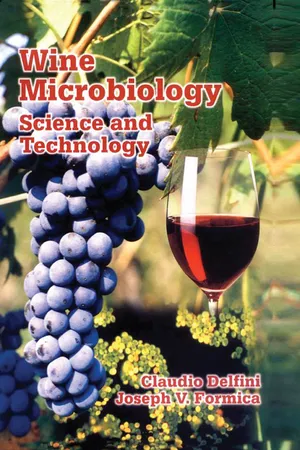
- 496 pages
- English
- ePUB (mobile friendly)
- Available on iOS & Android
eBook - ePub
About this book
This volume applies an inductive experimental approach to recognize, control and resolve the variables that effect the wine-making process and the quality of the final product - focusing on the grape variety-yeast interaction controversy. It contains over 300 drawings, photographs and photomicrographs that illustrate the diagnostic morphology of wine yeast and bacteria used to track wine spoilage and related problems.
Frequently asked questions
Yes, you can cancel anytime from the Subscription tab in your account settings on the Perlego website. Your subscription will stay active until the end of your current billing period. Learn how to cancel your subscription.
At the moment all of our mobile-responsive ePub books are available to download via the app. Most of our PDFs are also available to download and we're working on making the final remaining ones downloadable now. Learn more here.
Perlego offers two plans: Essential and Complete
- Essential is ideal for learners and professionals who enjoy exploring a wide range of subjects. Access the Essential Library with 800,000+ trusted titles and best-sellers across business, personal growth, and the humanities. Includes unlimited reading time and Standard Read Aloud voice.
- Complete: Perfect for advanced learners and researchers needing full, unrestricted access. Unlock 1.4M+ books across hundreds of subjects, including academic and specialized titles. The Complete Plan also includes advanced features like Premium Read Aloud and Research Assistant.
We are an online textbook subscription service, where you can get access to an entire online library for less than the price of a single book per month. With over 1 million books across 1000+ topics, we’ve got you covered! Learn more here.
Look out for the read-aloud symbol on your next book to see if you can listen to it. The read-aloud tool reads text aloud for you, highlighting the text as it is being read. You can pause it, speed it up and slow it down. Learn more here.
Yes! You can use the Perlego app on both iOS or Android devices to read anytime, anywhere — even offline. Perfect for commutes or when you’re on the go.
Please note we cannot support devices running on iOS 13 and Android 7 or earlier. Learn more about using the app.
Please note we cannot support devices running on iOS 13 and Android 7 or earlier. Learn more about using the app.
Yes, you can access Wine Microbiology by Claudio Delfini,Joseph V. Formica in PDF and/or ePUB format, as well as other popular books in Technology & Engineering & Food Science. We have over one million books available in our catalogue for you to explore.
Information
Table of contents
- Cover
- Title Page
- Copyright Page
- Preface
- Preface
- Introduction
- Table of Contents
- 1. The Compound Microscope
- 2. Microscopic observation techniques
- 3. Preparation and set-up for microscopic observation
- 4. Counting bacteria and yeast cells in must and wine
- 5. Sterilization techniques
- 6. The antiseptic effect of sulfur dioxide
- 7. Correlation between pH, buffer power, oxidation-reduction potential, microbiological stabilization and the acid taste of wine
- 8. Alternative techniques to the use of sulfur dioxide for microbiological stabilization
- 9. Cleansing and sanitation
- 10 Taxonomy, biology, cytology and morphology of wine-associated yeasts
- 11. Isolation, selection and purification of wine yeasts
- 12. Oenological characteristics of selected yeast strains and their genetic improvement
- 13. Current and prospective microbiological topics in enology
- 14. The metabolism of sugars and nitrogen by yeast
- 15. The oxygen requirement for wine yeast
- 16. Microbiological monitoring of must and wine
- 17. The use of selected yeast strains
- 18. The formation of organoleptically important metabolites
- 19. The production of acetic acid by yeasts
- 20 Biological degradation of malic acid
- 21. Microbiological control of concentrated musts and sulfured musts
- 22. The microbiological control of wine during storage
- 23. Methodology for the microbiological stabilization of musts and wines
- 24. Microbiological stabilization of wine through thermal treatment. Pasteurization and hot bottling
- 25. Microbiological stabilization through filtration
- Appendix Microscopic and chemical assays used for the identification of sediment. Techniques used to determine a wine’s propensity to develop turbidity
- Bibliography
- Index